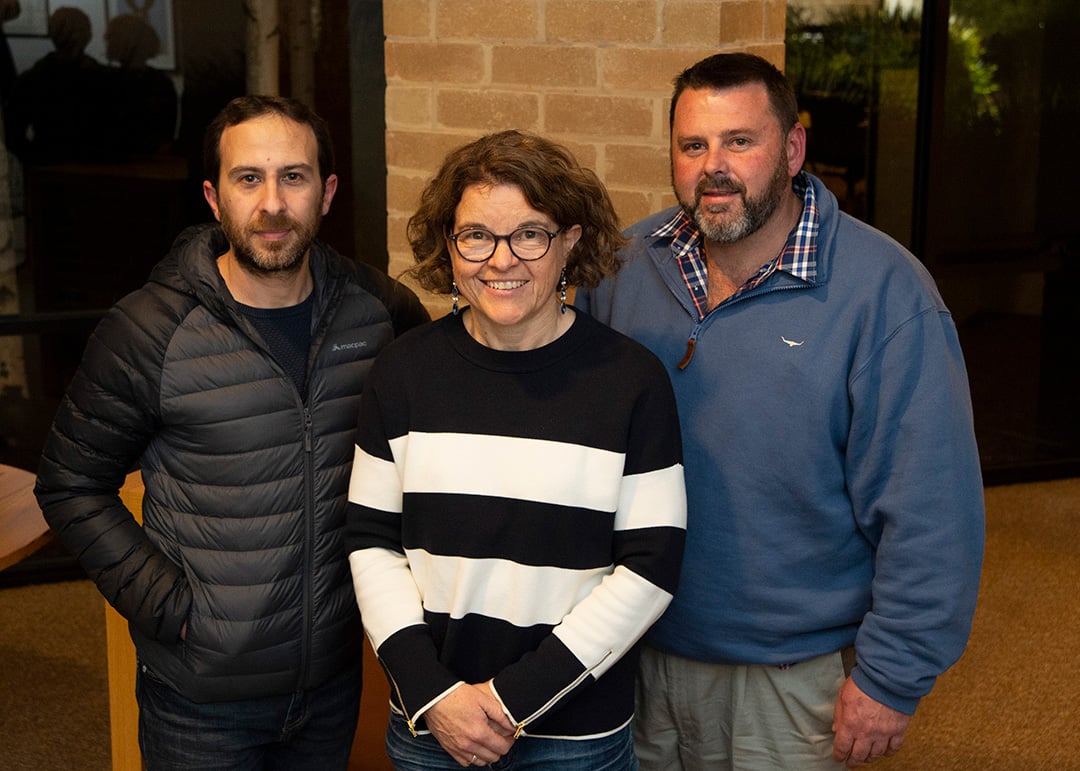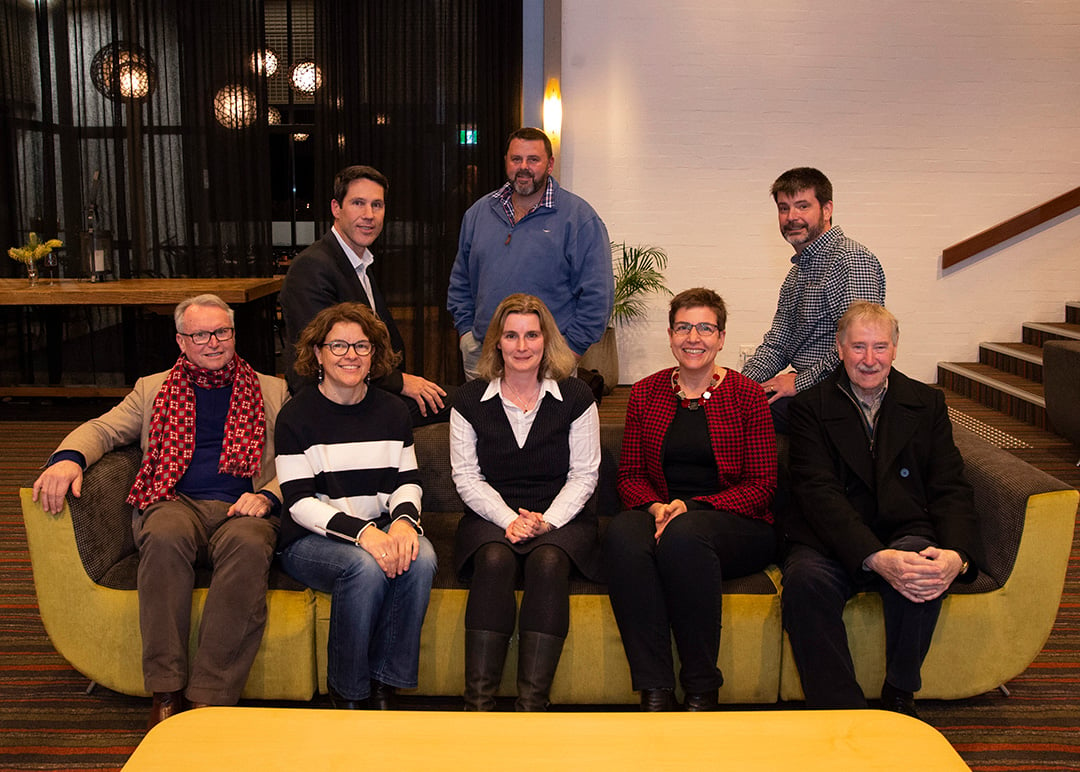CeRRF team
Our team at the Centre for Regional and Rural Futures (CeRRF) is led by Director, Associate Professor Rebecca Lester. Our researchers are working hard to advance food and food security, smart agriculture and regional competitiveness by collaborating with rural and regional industries and communities.
CeRRF Leadership Group


CeRRF Team
| Name |
|---|
|
Director Rebecca Lester Associate Professor, Freshwater Ecology, Quantitative Aquatic Ecosystem Laboratory Contact: directorcerrf@deakin.edu.au |
|
Industry Professor – Director, Research Partnerships David Halliwell |
|
Administration Officers Julie Nichols (Mon – Fri) Skye Mewha (Mon – Wed) Julie Parker (Fri only) |
|
Strategic Advisor David Downie |
|
Research Leader, Irrigation Science Associate Professor John Hornbuckle |
|
Research Leader, Climate Change Adaptation Associate Professor Robert Faggian |
|
Research Leader, Strategic Spatial Planning Associate Professor Victor Sposito |
|
Senior Research Fellow, Soil Health Dr Lambert Brau |
|
Senior Research Fellow, Soil Health Dr Wendy Quayle |
|
Associate Research Fellow Dr Carlos Ballester Lurbe |
|
Professor, Smart Sensing Professor Rosanne Guijt |
|
Associate Research Fellow Dr Ashley Macqueen |
|
Associate Research Fellow Dr Galen Holt |
Griffith Irrigation Laboratory Group
| Name |
|---|
|
Irrigation Engineer Associate Professor John Hornbuckle |
|
Environmental Scientist Dr Wendy Quayle |
|
Irrigation Scientist Dr Carlos Ballester Lubre |
|
IoT/Sensing systems Engineer Dr Rodrigo Filev Maia |
Sustainable Regional Development Group
Dr Robert Faggian is A/Professor of Climate Change Adaptation at Deakin University and splits his time between CeRRF, the School of Life and Environmental Sciences (LES) and Deakin’s Global Engagement Group. Robert has an interdisciplinary research background with an emphasis on systems-related issues (climate change, regional development, water resource management, food, and fibre production). His research focuses on the impacts and opportunities of climate change on agricultural and related systems at the regional level and developing practical responses (adaptation options, sustainable regional development plans, etc). He has led state-wide research projects on irrigation efficiency and regional development, national research projects on recycled water, and international research projects climate change adaptation. Robert has a strong track record of i) building collaborative links within and between sectors, ii) effective engagement with governments, businesses and communities, and iii) attracting industry funding (he has secured more than AUD $12m in industry- and government-funded projects. Robert also teaches and trains postgraduate students and currently has 10 PhD students and 40 Masters students.
Victor A. Sposito - MPhil Regional Planning and Urban Design (Edinburgh), MSc Civil Engineering (Texas) and Civil Engineer (Uruguay), is currently A/Professor in Strategic Spatial Planning in both the CeRRF and the Faculty of Science, Engineering and Built Environment (SEBE), in Deakin. Over the years, he has alternated his professional and academic work between Australia and Uruguay. In Uruguay, he was Chief and Programming Engineer in ANCAP Paysandú Industrial Complex (Refinery, Distillery, and Portland Cement) and Consultant to the National Ministry of Territorial Planning, Environment and Housing. In Australia, Sposito was Principal Research Scientist and Project Director in the Government of Victoria - Department of Primary Industries (DPI). He also held positions of Executive Director/Director of Strategic Regional and Metropolitan Planning in the (then) Ministry for Planning and Environment. Sposito is a Fulbright Scholar and the former recipient of a British Government Scholarship to study planning in the UK. He has led major projects in national, urban, regional/rural, and organizational development and planning in Australia and abroad, and has an international and national reputation for leading-edge initiatives in sustainable economic development. He has written and published extensively in those fields and has lectured and researched in various universities in South America, Australia, and Europe. Sposito has won multiple Australian and international awards in the fields of urban, regional and environmental planning. He was conferred in 2003 the title of Fellow of the Planning Institute of Australia (PIA) in recognition of his contributions to planning and development in Australia. Recently, Sposito was also conferred the title of Academic by PIA and appointed as a member of the Academy of Engineering in Uruguay.
Madeleine Johnson - BEng (Hons) & BA (Hons) RMIT, GDip (Sustainable Regional Development) Deakin University, Johnson is a Research Fellow – Spatial Analysis and Modelling in Deakin CeRRF whose principal role is focused upon the delivery of agricultural development projects, investigating climate change impacts and agricultural production as well as likely regional responses to projected changes in future climate scenarios at a regional and community level. She specifically looks at identifying, and mapping, regional strategies for implementing alternative agricultural management systems, in particular, sustainable intensification of agriculture. Johnson is also an Associate Lecturer, responsible for developing and delivering lecturers in three units, in both Bachelor and Master levels, at Deakin University.
Hemayet Hossain - Doctor of Environmental Design (Texas A&M University, USA), M.Sc. Geography (Dhaka University, Bangladesh) is a Senior Fellow at the Centre for Regional and Rural Futures (CeRRF), Deakin University. Hossain has more than 30 years of experience in Spatial Analysis and modelling and the use of GIS and Remote Sensing in Decision Support Systems for the planning and management of human-made and natural resources. Hossain has worked in the State Government of Victoria (Australia) - Department of Primary Industries as a Senior Research Scientist, addressing urban and rural land-use planning and management issues for State Government’s instrumentalities and Local Governments. He has also worked for many years as Land Specialist for the UN-HABITAT HQ in Nairobi, Kenya and was also involved in land planning and management challenges in several developing countries. Hossain has taught and researched on natural and built environment planning at several Universities in Australia, Bangladesh, USA, and Thailand and has presented and published research findings in many international conferences and journals. He is now teaching Regional Development Modelling methods and supporting advanced research at Deakin University.
Environmental Remediation Group
Professor Chuxia Lin has recently joined CeRRF with an intention to form a research group devoted to environmental research and technology development. Major research interests include: - could this section go under meet the CeRRF team and go under the leadership group team
- Remediation of petroleum hydrocarbon-contaminated soils and groundwater, particularly in desert areas
- Mine site remediation and rehabilitation
- Treatment and beneficial uses of industrial wastes
- Acid sulfate soil management
- Environmental risk assessment and remediation of soils contaminated by organic and inorganic pollutants
- Climate change mitigation
The Smart Sensing Group
The Smart Sensing Group develops small and manufacturable technologies for sensing and separation that improve productivity, aid in the prevention of disease and facilitate early detection of environmental and ecological treats. The research combines expertise in separation science, chemical sensing and molecular biology with precision manufacturing for the development of tailored, deployable instrumentation.
Team
Dr Ryan Nai provides expertise in molecular biology, covering a broad range or nucleic acid amplification technologies including Polymerase Chain Reaction (PCR) and isothermal approaches like Loop mediated isothermal amplification (LAMP), Nucleic Acid Sequence Based Amplification (NASBA) and Recombinase Polymerase Amplification (RPA). Providing a fundamental understanding of the amplification chemistry allows for tailoring the amplification methods for field-based applications.
Dr Egan Doeven provides expertise in (electro)chemical sensing and analysis and 3D printing, building on combined interests in chemistry and electrical engineering. His in-depth understanding of electrochemiluminescence has allowed him to develop practical applications of this detection technology, including the development of a mobile phone based assay for in-field detection. In 3D printing, Dr Doeven introduced LCD-based printers as a practical and economic alternative to digital light projection (DLP) approaches. Combining skills in chemistry and engineering allow him to tailor products at the chemistry/engineering interface, as required for the translation of chemical analysis methods to a field-portable format.
Mr Richard Alexander provides the Smart Sensing team with highly developed skills in engineering and design. He is responsible for precision manufacturing and provides expertise in microfluidic design, underpinned by computational fluid dynamics and manufacturing using CNC milling and injection moulding. At Deakin, he operates two injection moulders, one for thermoplastics and a pilot scale silicone moulder. In addition to providing project support, his research contributions include enhancing microfluidic device functionality and over-moulding of carbon fibre for the fabrication of composites.
Prof Rosanne Guijt heads the Smart Sensing team. She has a strong background in the development of field-portable analytical platforms, aiming on the use of microfluidics for enhanced temporal and chemical resolution. Her expertise includes electrophoretic separations, segmented flow assays and more recently nucleic acid detection. She has pioneered the use of 3D printing as manufacturing alternative in microfluidics, focusing on manufacturability and functional integration. The applications of her research are widespread and range from small inorganic ion analysis for explosive detection to the detection of pathogens and microscopic organisms.
Soil Health Group
Our Soil Health Group research focusses on understanding the agro-ecology of soils to develop modern, sustainable farming practices that improve soil health for cropped plants. We work on the physiological, genetic and biochemical basis of plant-microbe interactions and the application of beneficial microbes to enhance crop production in Australian agricultural systems to decrease dependence on chemical fertilizer inputs. Internationally, we work on integrated soil fertility management practices by smallholder farmers in developing countries to increase yields and farm profitability.
Our work directly addresses CeRRF’s Food and Food Security core priority, and is focussed on enhancing agricultural productivity in Australian and international farming systems in ways that focus on sustainable practice, profitability and social impact.
Soil Health Group Research team
Dr. Lambert Bräu
My research focusses on soil health, sustainable agriculture and agro-ecology. Plant-microbe interactions, beneficial microbes to enhance crop production in agricultural systems and Biological Nitrogen Fixation.
Mr. Dasun Premachandra
Discovery of plant growth-promoting bacteria and characterisation of their modes of action’ Using separation science techniques and mass spectroscopy tools to characterise the bacterially produced products that enhance plant growth. This includes secondary metabolites and nutrient solubilising peptides (siderophores).
Mr. Aydin Enez
Enhancing canola plant growth by reducing abiotic stress and improving overall soil health using beneficial microbes’ will characterise the stress impact of high levels of metals in soils towards canola yield and investigate whether using beneficial microbes or their bioactive compounds can be used to alleviate this stress on the cropped plants.
Mr. San Le
Can agroecological management practices result in sustainable tea production in Thai Nguyen and Phu Tho provinces, Northern Vietnam?’
Ms. Rajvi Bhatt
Project: Development of biosand filters for removing heavy metals from contaminated water
Ms. Thilini Mudiyanselage
Project: Formulation of products for on-seed delivery of microbial inoculants
Ms. Rim Melham
Project: Assessment of the ability for bacterially-produced metal chelating peptides to alter the essential trace metal levels in mammalian cell

